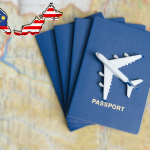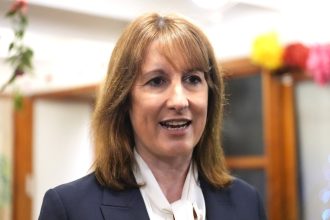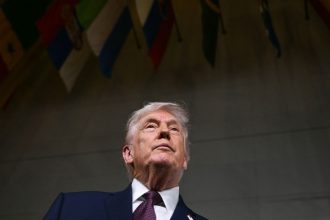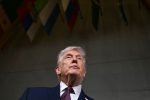Canadian Prime Minister Justin Trudeau announced his resignation on Monday, citing rising discontent with his leadership and growing instability within his government, further highlighted by the unexpected departure of his finance minister. In an emotional statement, Trudeau acknowledged that he could no longer lead the country into the upcoming elections due to internal conflicts. He expressed his intention to remain in office until a new leader of the Liberal Party is chosen.
“I have never backed down from a challenge, especially when it comes to our party’s future and the well-being of Canadians. But I believe it’s time for fresh leadership,” said Trudeau outside his official residence. He added that Parliament, originally scheduled to resume on January 27, would be suspended until March 24, allowing time for a leadership race within the Liberal Party.
With opposition parties united in their plan to trigger a no-confidence vote upon Parliament’s return, a spring election is now seen as imminent after the Liberal Party selects a new leader. Trudeau reflected on the importance of the Liberal Party to Canada’s democratic heritage, expressing hope for a new prime minister who would carry forward the party’s values.
Trudeau’s political career, which began with his election as Prime Minister in 2015 following a decade of Conservative rule, saw initial praise for his progressive policies and promises of a return to Canada’s liberal roots. However, in recent years, his popularity has waned significantly. Rising costs of living, housing, and immigration issues have led to increasing dissatisfaction with his leadership, culminating in his decision to step down.
Internationally, Trudeau’s resignation comes at a delicate time for Canada, particularly with escalating tensions with the United States. President-elect Donald Trump’s threats to impose tariffs on Canadian goods, citing concerns about migration and drug flows, have added to the pressure on the Trudeau government.
Despite the growing demands for his resignation, Trudeau had remained largely silent in recent weeks, further fueling speculation about his political future. The situation escalated after the resignation of former finance minister Chrystia Freeland on December 16, who criticized Trudeau’s economic priorities in light of external threats, particularly from Trump. Her resignation, following that of the housing minister, exposed deepening rifts within the government.
Freeland’s concerns about Trudeau’s economic policies, including his plans for a temporary sales tax holiday and direct payments to citizens, were evident in her resignation letter, where she argued that Canada must prioritize fiscal stability over “costly political gimmicks” as the country faces potential trade battles.
Trudeau’s chances of securing a fourth term in office, despite his party’s history of dominance, appeared increasingly unlikely. Recent special elections in traditionally Liberal strongholds like Toronto and Montreal revealed the growing discontent among the electorate, with polling data showing the Liberals trailing the Conservative Party by a significant margin.
During his time in office, Trudeau championed liberal causes such as immigration, diversity, gender equality, and cannabis legalization. His efforts to balance economic growth with environmental protection, including the controversial carbon tax and support for pipeline expansion, led to criticism from both ends of the political spectrum. While Canada’s handling of the COVID-19 pandemic was generally seen as effective, his government faced backlash from those opposed to vaccine mandates, particularly in rural areas.
A legacy marked by both achievements and controversies, Trudeau now faces the end of his political journey. His father, Pierre Trudeau, led Canada for nearly 16 years, and Justin’s rise to power was often seen as following in his father’s footsteps. However, his tenure, though filled with star power and hope, ultimately left him grappling with internal divisions and growing discontent.
Justin Trudeau’s resignation marks the end of an era for Canada’s Liberal Party and the beginning of a new political chapter. As the country moves towards a leadership transition, Canadians will watch closely to see how the political landscape evolves in the months ahead.








